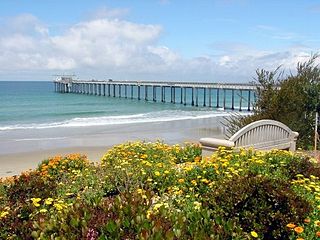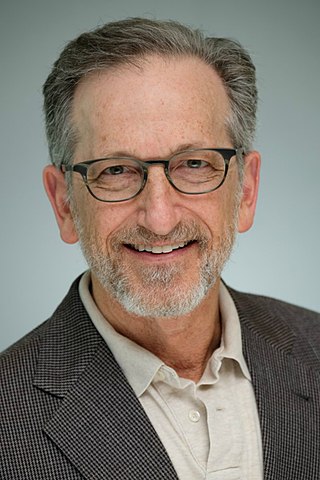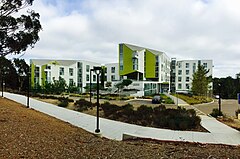
The University of California, San Francisco (UCSF), is a public land-grant research university in San Francisco, California, United States. It is part of the University of California system and is dedicated entirely to health science and life science. It conducts research and teaching in medical and biological sciences.

The University of California, San Diego is a public land-grant research university in San Diego, California, United States. Established in 1960 near the pre-existing Scripps Institution of Oceanography in La Jolla, UC San Diego is the southernmost of the ten campuses of the University of California. It offers over 200 undergraduate and graduate degree programs, enrolling 33,096 undergraduate and 9,872 graduate students, with the second largest student housing capacity in the nation. The university occupies 2,178 acres (881 ha) near the Pacific coast.

La Jolla is a hilly, seaside neighborhood in San Diego, California, occupying 7 miles (11 km) of curving coastline along the Pacific Ocean. The population reported in the 2010 census was 46,781. The climate is mild, with an average daily temperature of 70.5 °F (21.4 °C).

Scripps Institution of Oceanography (SIO) is the center for oceanography and Earth science at the University of California, San Diego. Its main campus is located in La Jolla, with additional facilities in Point Loma.
The Stanford University School of Medicine is the medical school of Stanford University and is located in Stanford, California, United States. It traces its roots to the Medical Department of the University of the Pacific, founded in San Francisco in 1858. This medical institution, then called Cooper Medical College, was acquired by Stanford in 1908. The medical school moved to the Stanford campus near Palo Alto, California, in 1959.

Scripps Research is a nonprofit American medical research facility that focuses on research and education in the biomedical sciences. Headquartered in San Diego, California, the institute has over 170 laboratories employing 2,100 scientists, technicians, graduate students, and administrative and other staff.
The Keck School of Medicine of the University of Southern California teaches and trains physicians, biomedical scientists and other healthcare professionals, conducts medical research, and treats patients. Founded in 1885, it is the second oldest medical school in California after the UCSF School of Medicine.

Roger Randall Dougan Revelle was a scientist and scholar who was instrumental in the formative years of the University of California, San Diego and was among the early scientists to study anthropogenic global warming, as well as the movement of Earth's tectonic plates. UC San Diego's first college is named Revelle College in his honor.
UC San Diego Health is the academic health system of the University of California, San Diego in San Diego, California. It is the only academic health system serving San Diego and has one of three adult Level I trauma centers in the region. In operation since 1966, it comprises three major hospitals: UC San Diego Medical Center in Hillcrest, Jacobs Medical Center in La Jolla, and East Campus Medical Center at UC San Diego Health in East County. The La Jolla campus also includes the Moores Cancer Center, Shiley Eye Institute, Sulpizio Cardiovascular Center, and Koman Family Outpatient Pavilion, and the health system also includes several outpatient sites located throughout San Diego County. UC San Diego Health works closely with the university's School of Medicine and Skaggs School of Pharmacy to provide training to medical and pharmacy students and advanced clinical care to patients.

Sanford Burnham Prebys is a 501(c)(3) non-profit medical research institute focused on basic and translational research, with major research programs in cancer, neurodegeneration, diabetes, infectious, inflammatory, and childhood diseases. The institute also specializes in stem cell research and drug discovery technologies.
Scripps Health is a nonprofit health care system based in San Diego, California. The system includes five hospital campuses and 30 outpatient centers and clinics, and treats more than 600,000 patients annually through 3,000 affiliated physicians. The system also includes clinical research and medical education programs.
The UC San Diego Student-Run Free Clinic Project is a nonprofit free clinic that maintains four community locations and is headquartered at the University of California San Diego School of Medicine in La Jolla, California. The UC San Diego Student-Run Free Clinic Project is 1 of approximately 24 student-run clinic programs in the nation; students plan, manage, and carry out clinic operations under the supervision of licensed physicians. The UC San Diego Student-Run Free Clinic Project seeks to provide high-quality and comprehensive care to uninsured and underserved patients throughout San Diego, who cannot otherwise afford access to care; the majority of patients are working poor. Its four clinics are located at the First Lutheran Church in downtown San Diego, the Pacific Beach United Methodist Church in Pacific Beach, Baker Elementary School located just north of National City, and Golden Avenue Elementary School in Lemon Grove.
The Irwin and Joan Jacobs School of Engineering is an undergraduate and graduate-level engineering school offering BS, BA, MEng, MS, MAS and PhD degrees at the University of California, San Diego in San Diego, California. The Jacobs School of Engineering is the youngest engineering school of the nation's top ten, the largest by enrollment in the University of California system, as well as the largest engineering school on the West Coast and the ninth-largest in the country. More than thirty faculty have been named members of the National Academies. The current dean of the Jacobs School of Engineering is Albert P. Pisano.

Victor Nizet is an American physician-scientist and microbiologist. He is a Distinguished Professor and Vice Chair of Basic Research at the Department of Pediatrics at the University of California, San Diego (UCSD) School of Medicine. He is also a Distinguished Professor at UCSD Skaggs School of Pharmacy and Pharmaceutical Sciences in La Jolla, California. He is known for his research in the areas of molecular microbiology and the innate immune system, with a particular focus on infectious diseases caused by common Gram-positive bacterial pathogens such as Group A Streptococcus, Group B Streptococcus and Staphylococcus aureus.

The Center for Academic Research and Training in Anthropogeny (CARTA) is a center at the University of California, San Diego. Formally established in 2008, CARTA is a collaboration between faculty members of UC San Diego main campus, the University of California, San Diego School of Medicine, the Salk Institute for Biological Studies, and interested scientists at other institutions from around the world.
Igor Grant is an American psychiatrist. He is Distinguished Professor in the Department of Psychiatry in the School of Medicine at the University of California, San Diego. He is Director of the HIV Neurobehavioral Research Program (HNRP) and the Center for Medicinal Cannabis Research (CMCR). Grant is the founding Editor of the Journal of the International Neuropsychological Society and founding co-editor of the journal AIDS and Behavior. His work focuses on effects of HIV and drug use, particularly alcohol, medical marijuana, and methamphetamine.

Jacobs Medical Center is a teaching hospital on the University of California, San Diego campus in the La Jolla neighborhood of San Diego. Along with the UC San Diego Medical Center, Hillcrest, it serves as a flagship hospital of UC San Diego Health and the primary teaching hospital for the UC San Diego School of Medicine. The facility, which offers specialized care not previously available in San Diego County, opened in 2016.

The UC San Diego Medical Center, Hillcrest is one of three medical centers of UC San Diego Health and is a teaching hospital for the University of California, San Diego School of Medicine.

Gary S. Firestein is an American rheumatologist, professor, and founding director of the Altman Clinical and Translational Research Institute (ACTRI) at the University of California San Diego and Senior Associate Vice Chancellor for Health Sciences at University of California, San Diego.
Ruth S. Waterman is an American anesthesiologist, Chair of the Department of Anesthesiology at UC San Diego Health, Associate Clinical Professor at UC San Diego School of Medicine, and Co-Founder and Chief Medical Officer of Commence Bio, a company that specializes in next generation stem cell therapy and cancer immunotherapy. Waterman is known for developing stem cell-based therapies to help patients with pain and advancing methods to personalize pain medicine based on pre-surgery genetic testing.

















